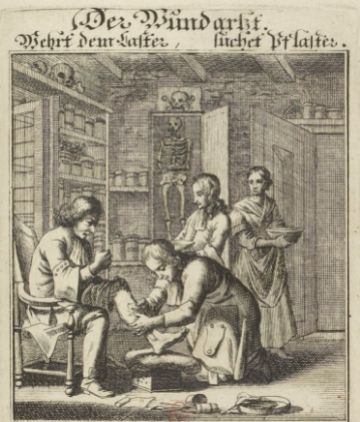Ruedi Küentzli
In 1657 I stayed several times in the Emmental. I was called as an Anabaptist doctor to advise and help in particularly difficult cases of illness. I always gave Trachselwald Castle a wide berth so as not to end up in one of the notorious cells. The bailiff of the castle had received orders from Bern to search for me and to take me prisoner. [1]
More information:
The Anabaptist doctor Ruedi Küentzli from Muhen in Aargau

Le médecin des plaies (extrait de : Johann Christoph Weigel, Abbildung der Gemein-Nutzlichen Haupt-Stande [...], Regensburg 1698, planche entre les pages 132 et 133).
Actually, it all started many years ago with my wife's illness.[2] When nothing and no one could help against her pain, I myself started to ask around among people who knew healing. And since my ointments, tinctures and minor procedures were so successful, word soon got around. Although I was an Anabaptist myself, more and more people came to me and asked me for help for their afflictions.
It was always important for me not to use any hocus-pocus, but only natural remedies. I have always admonished the sick, "they should fervently appeal to the dear God and ask him to give them a cure, so that it may operate [=work], and they might get back to their former health, because without God's blessing the external remedies would be in vain. [3]
As an Anabaptist, I was suspect to the authorities anyway. The Reformed pastor of Schöftland promptly reported me to the bailiff because of my Anabaptist convictions. And also in Lenzburg I was imprisoned for a longer time because of that. But when they wanted to deport me, the people in the villages interceded in my favor. As long as there was no one who was as committed as I was to their well-being in case of illness, it was irresponsible to deport me.[4]
It certainly took courage to stand up for an Anabaptist like me with the authorities. But the argument that something essential would be missing if people like me were locked up and deported apparently made the bailiff give in grudgingly. And of course I was happy.
That we as Christians should assist and help others wherever we can was a high priority in our Anabaptist communities. And of course we were happy when our help in medical and pastoral matters was also appreciated outside our own circles. And not infrequently it saved us from deportation and expulsion.
Therefore, it is no wonder that so many of us Anabaptists in the Bern region worked as popular country doctors, midwives or physicians.[5]
Actually, we all should have been imprisoned and deported long ago - but appreciation and pressure from the common people sometimes forced the "Gnädigen Herren" (merciful lords) in Bern to grant an exception. [6]
[1] StABE, A II 440, 45 (June 10, 1657).
[2] Cf. the statement of Küentzli from the year 1645 in StABE, B III 194, 5.
[3] Cf. the statements of Landvogt Gerold Grebel von Kyburg / ZH on the Anabaptist doctor Jacob Zehnder von Waltenstein in the year 1634, in Universitätsbibliothek Basel, Handschriften VB Mscr F 72, Nr 3.
[4] Cf. the statements of the Lenzburg bailiff in 1657, in StAAG, Bd.795, 833.
[5] Cf. also the example of Ueli Galli of Eggiwil, probably the father of the well-known peasant war leader of the same name: he too was an Anabaptist doctor! StASO A1, No. 103, 348. Ulrich Berger, Der Lebensweg des Täufers und Schärers Ulrich Galli senior aus dem Eggiwil, in: Mennonitica Helvetica 32/33 (2009/2010), 190-236.
[6] On the topic of Anabaptist physicians, see Hanspeter Jecker, Im Spannungsfeld von Separation, Partizipation und Kooperation: Wie täuferische Wundärzte, Hebammen und Arzneyer das "Wohl der Stadt" besuchen, in: Mennonitica Helvetica 39 (2016), 21-33.



